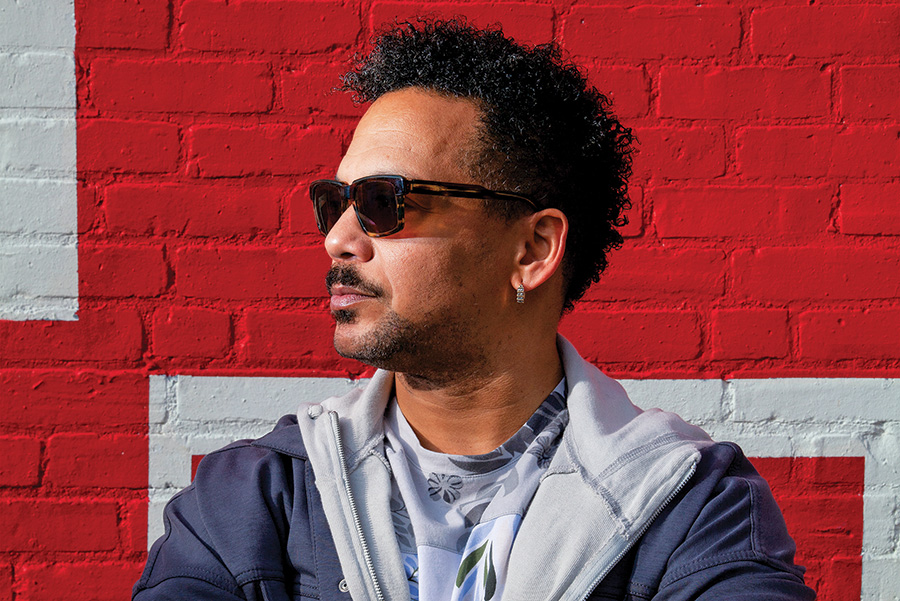Joe Wilson Jr.: The Leading Man
For the Rhode Island actor, educator and activist, all the world's a stage - one he's trying to mend and mold through the power of art.

It seems as if Trinity Rep has been having these conversations for some time. A while back, you were named the Coordinator for Activism through Performance; can you take us back to how that was developed?
That idea came to me as a result of our work with the America Too project, which was birthed out of a residency I did in Ferguson, Missouri, the year after Michael Brown was murdered. It was an incredible way for me to begin to understand how to hear stories from the community and to use art-making as a tool for healing. Over the course of a week, we developed ninety one-minute plays about justice and equity and policing.
I got off the plane on Sunday and we had an event at Trinity Rep that Monday, in which we invited actors to come and read the work and invited an audience to see the work. It was called the Every 28-Hour Plays; the premise is that someone of the BIPOC community dies by police violence every twenty-eight hours. I think about fifty actors signed up to read these ninety plays. Then ninety actors showed up. We had about 150 people who signed up to watch the plays. About 350 showed up. It was one of the most incredible moments in the theater of advocacy I’ve ever experienced.
I think it was one of the first times the material didn’t lead the community, but the community came together to experience a piece and to respond to a piece. We reproduce those plays every year; we’ve tackled subjects from health care to housing to immigration — based upon what I felt like the community was talking about, what was really in the zeitgeist.
Where it stands now is it has been placed into the strategic plan of our institution. This was an idea that was developed by myself about six years ago, and we’re still trying to fully realize that. We went through this period seven years ago when we really became hyper-conscious of equity, diversity and inclusion. And with the advent of COVID and where we’ve been politically the past five years, we’ve come to understand that many of our institutions, mine included, have not done the work that we really needed to do to create a truly equitable environment.
Have there been conversations amongst the BIPOC company members about racism at Trinity Rep?
A group of us formed an affinity group during COVID, and we began having conversations about our experiences. I think the beauty of an affinity space is you can finally look at another person and go, “Wait a minute, I’m not crazy when I felt that.” You know, almost seventeen seasons of being here, I was able to put some things together for myself and understand them better from a context of equity, inclusion, diversity and access. And so we’ve been in an active dialog with our institution about these issues. We now have a new executive-level position person responsible for all of our DEIA initiatives. The sense of activism performance is in the new strategic plan.
In thinking about activism in performance, as director of the 2021 A Christmas Carol, you included a land acknowledgment at the beginning. Can you speak a little bit about the reception, from viewers and reviewers?
It was developed by the theater in consultation with our native elders in the community. I think the important part of this work is speaking into existence acknowledgment of where we have been. And there’s also an important part of the process that’s called restorative justice and acknowledgment of past harm.
We haven’t just been talking about color, but we’ve been talking about civil rights, justice, equity. And so I thought, Well, why don’t we have a member of the cast say the land acknowledgment?
So that was the impulse. I wanted to make it a part of the production because it was already a part of the way I was thinking about the production, acknowledging that we were not just making a play in ordinary times, but, you know, providing a space to acknowledge what we’ve all been through and what we’re all continuing to grapple with.
And what better play than this one, I would think.
I mean, Dickens wrote a political tale. He was not writing a benign tale about the transformation of a man. Everybody’s seen this production so many times. But I wanted people to not sit back, but to find a way to lean forward in the production. The ghosts don’t come to Scrooge all the time. They’re coming to him this night, at this time, because Scrooge is at a dangerous crossroads. And I think, too, we are, in this country, at a very dangerous crossroads.
So I wanted to create a production where all of the actors in the show belong. And they could see themselves in this world and they could be their fullest selves. And that also became an obsession of mine throughout — you know, how could this world be as diverse as it can be? And then I thought that that would also serve to further isolate Scrooge, this white man at the center of the story. There is a world outside of the world he’s created for himself that is very vibrant and very alive.
You’re also directing a show at the Gamm in January and February. I don’t know if I’ve ever seen you there before.
This is the first time that I will be working at the Gamm Theatre. We spoke prior to the beginning of COVID about me directing this play.
Tell us about An Octoroon. What has it been like for you, producing this work?
Well, this is a very different play from A Christmas Carol. It’s based upon a Dion Boucicault melodrama, and it’s written by Branden Jacobs-Jenkins, who is, I think, one of the most important young Black playwrights writing right now. It is a retelling of a melodrama, which takes place on a slave plantation in Louisiana. But the play is not about what happens on that plantation; it’s about the retelling of this tale by writers and stage actors and what it means to be an artist in a time when we’re reckoning with issues around inequality and race.
When you think about melodramas like The Birth of a Nation — even minstrelsy, you know, the Brer Rabbit stories — the way that we’ve used tales to help us understand who we have become is a direct descendant of white supremacy and anti-Blackness.
I think my task, throughout my life, has been to unravel those narratives that we’ve all been taught. I think the story is a powerful exploration of needing to dismantle these narratives. And I think, in the end, the play is an affirmation of the power of art — that art can be used for good. Art can be used to destroy; art can be used to uplift; art can be used to celebrate. But the point is, art is an active state that has consequences.
It sounds like you’ll be very busy throughout the next few months; you have another show around the same time at Trinity Rep. Can you tell us a little bit about that?
I will be in the production of August Wilson’s Gem of the Ocean and I’m also going to be teaching at Wheaton College. And so I have a lot ahead of me, but I feel so grateful to be able to be in this time and to be able to do all of this work.
There’s a piece of me that suffers from a little bit of survivor’s guilt because I know there are so many people out there who are suffering right now. Our industry has shifted. Our industry has shrunk and shrunk and is still very uncertain for those who are privileged enough to be a part of that smaller footprint. And so you’re not going to hear me complain about working. I guess I’m just trying to continue to do it with grace and to do it with purpose. I’m invigorated with where we are now, in the midst of being very tired sometimes.
I wouldn’t be a lifestyle writer if I didn’t ask you about your personal life. You’re very busy professionally. You have a lot going on; you’re a community leader. How do you spend your days when you’re not doing this work?
I have really good friends. I love to go out to eat; I love to watch Netflix. And, you know, I’m a big fan of Saturday and Sunday sports. But I also like to spend time alone. For a long time, I was always like, wah wah wah, I don’t have many people in my life. And why is that? I’ve come to realize: Joe, you set it up that way.
And sometimes it’s difficult to let people step into that space because I’m a little bit of a control freak, too. But every day I try to find time to do something nice for myself. I was raised on the philosophy of: “Every day, do something for your business.” The older I’ve gotten, I’ve understood along with doing something for your business every day, do something for yourself, whether that’s buying a new frock or getting a manicure, which I really have kind of gotten into lately. I’m loving color.
In terms of my dating life — that’s a whole other story; that’s basically nonexistent. But that’s okay.
We’ll spread the word.
Please, oh my god — please spread the word. A few years ago, I was on an eligible bachelor list so I’m here to say: I’m still eligible.
See Joe Wilson Jr.’s An Octoroon at the Gamm Theatre in Warwick now through February 20, and catch him in Trinity Rep’s Gem of the Ocean, directed by Jude Sandy, from February 24 through March 27.
This interview, compiled from two conversations, was edited and condensed for clarity. All Photography courtesy of Trinity Repertory Company and Joe Wilson Jr.
























